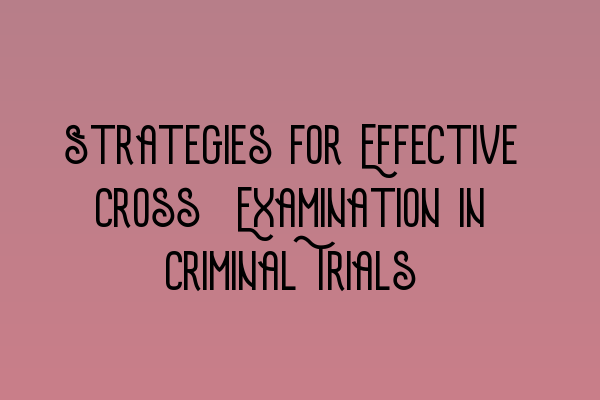Strategies for Effective Cross-Examination in Criminal Trials
In criminal trials, cross-examination is a critical part of the defence strategy. It provides an opportunity for defence counsel to challenge the credibility and reliability of the prosecution’s witnesses, expose inconsistencies in their testimony, and elicit information that may support the defence’s case. Effective cross-examination can make a significant difference in the outcome of a trial. Here are some strategies to consider:
1. Know Your Case Inside Out
Before conducting cross-examination, it is essential to have a thorough understanding of your client’s case, the relevant evidence, and the legal principles applicable to the trial. This knowledge will enable you to ask strategic and pointed questions that undermine the prosecution’s case.
2. Prepare Comprehensive Cross-Examination Outlines
Creating detailed outlines for each witness you plan to cross-examine is crucial. These outlines should include the main points you want to address, possible lines of questioning, and any specific contradictions or inconsistencies you have discovered in the witness’s statements or prior testimonies. Organizing your cross-examination in this manner will help you stay focused during trial and ensure that you cover all relevant areas.
3. Establish Rapport with the Witness
Building rapport with the witness can make them more open to answering your questions and may even lead them to provide information that benefits your client’s case. Be respectful and polite when questioning the witness, no matter how strong their testimony may appear. This approach can help you create doubt in the minds of the judge or jurors about the witness’s credibility.
4. Use Leading Questions to Your Advantage
Leading questions, which suggest the desired answer, can be a powerful tool during cross-examination. By carefully crafting leading questions, you can control the narrative and direct the witness’s responses in a way that supports your case. However, be cautious not to ask leading questions that the judge deems inappropriate or objectionable.
5. Listen Closely to the Witness’s Answers
While it is essential to prepare questions in advance, it is equally important to actively listen to the witness’s responses. By paying close attention, you can identify potential inconsistencies, evasions, or concessions that can be exploited during further questioning. Adjusting your line of inquiry based on the witness’s answers can strengthen your cross-examination and reveal weaknesses in the prosecution’s case.
6. Maintain Control and Composure
During cross-examination, it is essential to maintain control of the courtroom and project a composed and confident demeanor. Losing your temper, becoming argumentative, or displaying frustration can undermine your credibility and weaken your cross-examination. Stay focused, respectful, and professional throughout the process.
7. Summarize and Clarify Key Points
At the conclusion of cross-examination, take the opportunity to recapitulate the most crucial points you have established. This reinforces these points in the minds of the judge or jurors and reinforces the weaknesses in the prosecution’s case. Additionally, if the witness’s answers require clarification, use this opportunity to seek further clarification or eliciting concessions.
Effective cross-examination requires careful preparation, strategic questioning, and the ability to adapt to the witness’s responses. By employing these strategies, defence counsel can significantly impact the outcome of a criminal trial.
For more insights into UK criminal law, legal representation for Delaware LLCs in the UK, and strategies for overcoming legal challenges for UK businesses in the U.S., be sure to check out these related articles:
- Legal Representation for Delaware LLCs in the UK: Expert Advice
- Ensuring Ethical Business Practices: Delaware’s Code of Conduct
- Legal Challenges for UK Businesses in the U.S.: Strategies for Overcoming Hurdles
- UK Criminal Law: An In-Depth Analysis of the British Legal System
- Legal Challenges for UK Businesses in the U.S.: Strategies for Overcoming Hurdles
